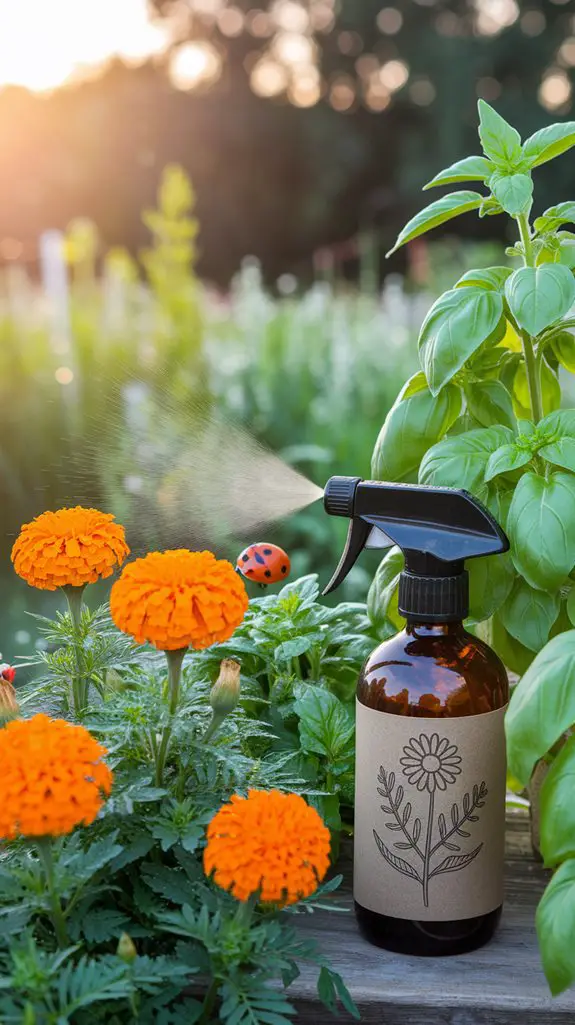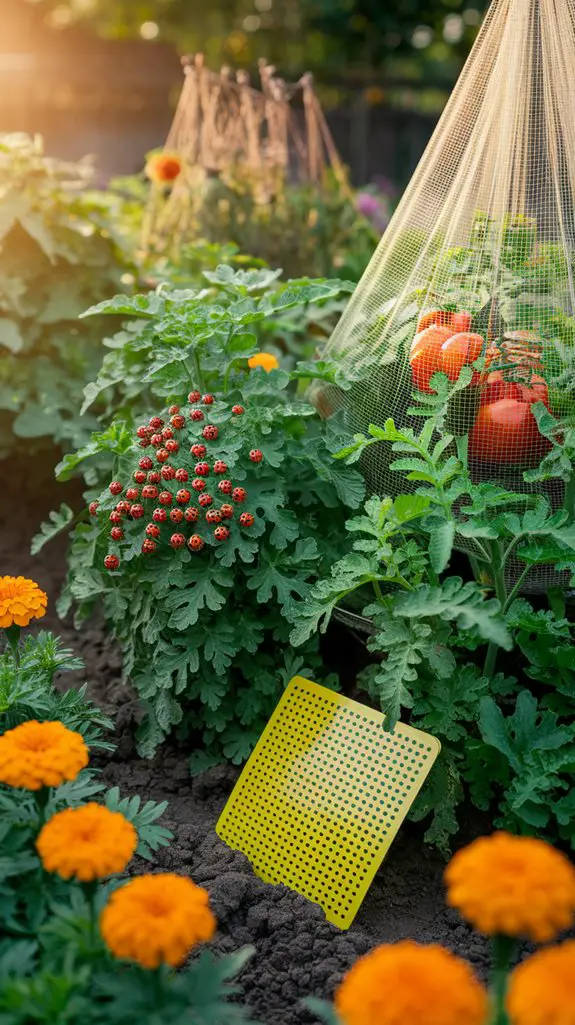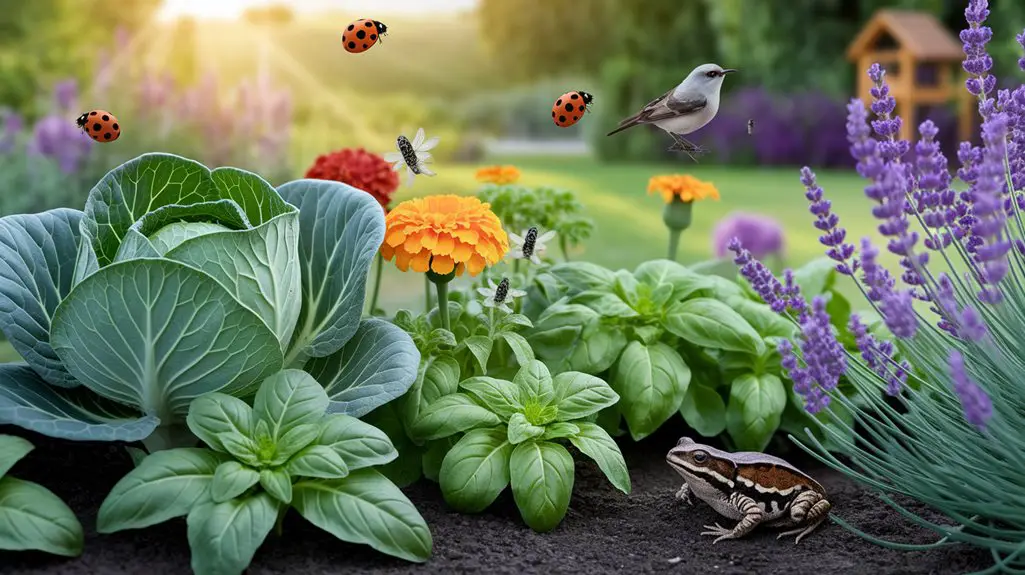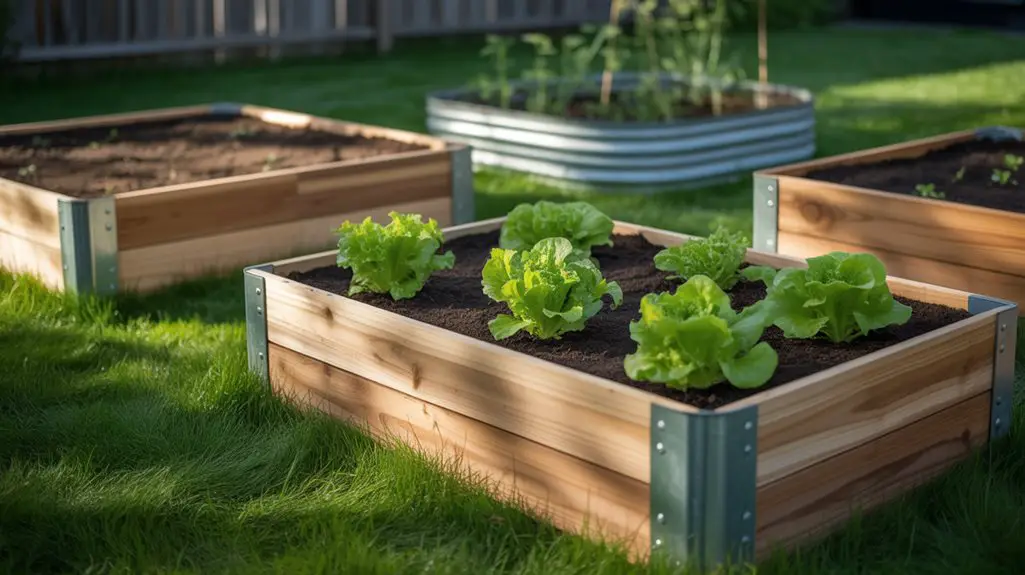Imagine discovering a colony of aphids on your prized tomato plants, yet being reluctant to reach for chemical pesticides. You’re not alone in seeking natural alternatives that protect both your garden and the broader ecosystem. Natural pest control methods offer effective solutions that work with nature rather than against it. From beneficial insects that hunt harmful pests to companion planting strategies that naturally repel unwanted visitors, these approaches can transform how you manage garden challenges.
Beneficial Insects and Companion Planting
Harnessing nature’s own balance system, beneficial insects serve as your garden’s first line of defense against destructive pests. Ladybugs, lacewings, and parasitic wasps prey on aphids, caterpillars, and other plant-damaging insects without harming your produce.
You can attract these helpful allies by planting nectar-rich flowers like marigolds, cosmos, and sweet alyssum throughout your garden. They’ll provide food and habitat for predatory insects while creating biodiversity.
Companion planting strengthens this approach by strategically positioning plants that naturally repel pests. Try interplanting basil with tomatoes to deter hornworms, or nasturtiums to draw aphids away from vegetables.
Aromatic herbs like rosemary and thyme confuse pests with their strong scents while attracting pollinators. This integrated system creates a resilient garden ecosystem that minimizes the need for interventions. Additionally, creating biodiversity in your garden enhances the effectiveness of these natural pest control methods.
Homemade Organic Sprays and Deterrents

When your garden’s natural defenses need reinforcement, homemade organic sprays and deterrents offer a powerful second line of protection. You can create effective solutions using common household ingredients that target specific pests without harming beneficial insects.
Mix one tablespoon of neem oil with a quart of water and a few drops of dish soap to combat aphids, mites, and whiteflies. For fungal issues, try a baking soda spray: dissolve one tablespoon in a gallon of water with a teaspoon of vegetable oil. Garlic-pepper spray deters many insects—simply blend garlic cloves with hot peppers, steep overnight in water, then strain and spray.
Always test new mixtures on a small plant area first, and apply during early morning or evening to prevent leaf burn. Incorporating effective natural solutions into your pest control routine can enhance the health of your garden and promote sustainable practices.
Physical Barriers and Traps

Physical barriers and traps represent one of gardening’s oldest and most reliable defense strategies against pests. These mechanical interventions create separation between your plants and potential invaders without introducing synthetic chemicals to your ecosystem.
You’ll find remarkable effectiveness in simple solutions: floating row covers protect crops from flying insects while allowing sunlight and water through; copper tape deters slugs and snails through mild electrical deterrence; sticky traps capture aphids and whiteflies before infestations develop.
For larger pests, consider installing raised beds with hardware cloth underneath to prevent burrowing rodents. Additionally, implementing chemical-free pest solutions can enhance your garden’s resilience to pest outbreaks.
The beauty of physical barriers is their specificity—they target problematic species while preserving beneficial insects. By combining multiple barrier methods, you’re creating an extensive protection strategy that works with nature’s systems rather than disrupting them through harsh chemical interventions.
Crop Rotation and Garden Design
Strategic garden design paired with thoughtful crop rotation creates a powerful foundation for natural pest management that works before problems even begin.
You’ll disrupt pest life cycles by moving plant families to different locations each season, preventing specialized pests from establishing permanent populations.
Design your garden with biodiversity in mind—interplant aromatic herbs like basil and rosemary among vegetables to confuse pests searching for host plants.
Create wildlife corridors and hedgerows to attract beneficial predators that keep pest populations in check.
Consider companion planting relationships: marigolds repel nematodes, while nasturtiums attract aphids away from crops.
Plant in blocks rather than rows to make it harder for pests to find their preferred hosts and incorporate flowering plants that provide nectar for parasitic wasps and predatory insects. Additionally, using organic pest control methods can further enhance the effectiveness of your natural strategies.
Soil Health and Plant Resistance
Building robust soil health forms the cornerstone of natural pest management, as plants grown in nutrient-rich, biologically active soil naturally develop stronger immune systems and greater resistance to pests. Your garden’s defense begins underground, where beneficial microorganisms create complex relationships with plant roots. Additionally, attracting beneficial insects to your garden can further enhance the natural pest control process.
| Soil Amendment | Benefits | Pest Resistance Effect |
|---|---|---|
| Compost | Improves structure, adds nutrients | Strengthens plant cell walls |
| Worm castings | Contains growth hormones, enzymes | Enhances systemic resistance |
| Biochar | Houses beneficial microbes | Creates unfavorable pest habitat |
| Mycorrhizal fungi | Extends root systems | Triggers plant defense compounds |
| Rock dust | Remineralizes soil with trace elements | Balances plant nutrition |
You’ll notice fewer pest problems when you focus on feeding soil life rather than simply fertilizing plants. Healthy soil creates resilient plants that produce natural chemical defenses against invaders.
Biological Controls and Natural Predators
Harnessing the power of nature’s own ecosystem dynamics, biological controls represent one of the most elegant and sustainable approaches to garden pest management.
You’ll find ladybugs, lacewings, and praying mantises are voracious predators of aphids, mites, and various soft-bodied insects that damage your plants.
Consider introducing parasitic wasps that target caterpillars and beetles, or beneficial nematodes to combat soil-dwelling pests.
Toads and birds also serve as valuable allies—install birdbaths and shelters to welcome these natural hunters.
You can purchase these beneficial insects from specialized suppliers, but it’s often more effective to create habitat conditions that naturally attract and sustain them.
Planting diverse flowering species, especially umbellifers like dill and fennel, provides essential nectar sources that support your garden’s protective predators throughout their life cycles. Additionally, eco-friendly pest control solutions can help maintain a harmonious balance in your garden ecosystem.
Conclusion
By embracing natural pest control methods in your garden, you’re creating a vibrant ecosystem that works a million times harder than any chemical ever could. You’ll support beneficial insects, improve soil health, and maintain nature’s delicate balance. These holistic approaches don’t just eliminate pests—they strengthen your garden’s resilience while protecting our precious pollinators and waterways. Your sustainable choices today nurture a healthier planet for tomorrow.




